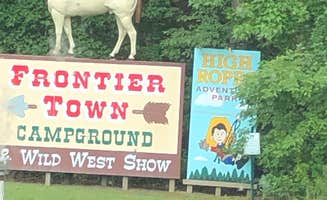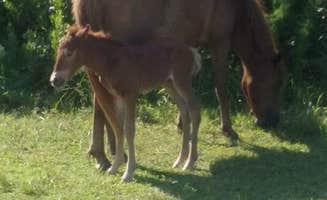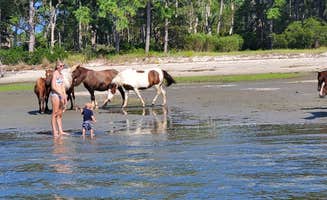Equestrian camping near Fenwick Island, Delaware offers riders access to diverse coastal ecosystems within a short drive. The area sits at sea level with maritime forests transitioning to salt marshes and barrier islands, creating varied terrain for trail riding. Winter temperatures average 35-45°F while summer brings 75-85°F conditions, making spring and fall optimal for horseback excursions due to reduced insects and moderate weather.
What to do
Beach riding permits: At Assateague Island National Seashore Oceanside Campground, riders need special permits for beach access. "We've been going here as a family for over 6 years. Its a great place to relax with less people on the public and private beaches. The wild ponies and deer are beautiful!!" notes Ashley M.
Kayaking with horses: Combine equestrian activities with water sports near Tall Pines / Chesapeake Bay KOA Holiday which offers boat rentals. "There is a beach area to swim but also 2 pools. There are fishing piers and boat rentals," mentions Laure D. This allows riders to observe horses from water perspectives.
Nature photography: The wildlife management area trails provide excellent photo opportunities. "Lots of trails. Pretty busy with Hunters during the season. Roosters here," reports Wayne L. about EA Vaughn Wildlife Management Area. Morning light creates optimal conditions for photographing horses in natural settings.
What campers like
Wild horse encounters: Visitors appreciate respectful wildlife viewing opportunities. "Horses will roam right into campsite," explains Karen W. at Bayside Assateague Campground. The unique chance to observe wild horses creates memorable camping experiences.
Trail diversity: Riders value having multiple terrain options for equestrian activities. A camper at Delaware Seashore State Park Campground notes, "We spent most of our time at the beach anyway so the small site really didn't matter much." This park offers beach riding access points for those with proper permits.
Water access: Equestrians appreciate facilities for both horses and humans. "We enjoyed our stay very quiet and easy to find. It was nice being on the water two," shares Bud B. about Tom's Cove Park. This combination of water features and equestrian access creates versatile recreation options.
What you should know
Horse management requirements: Riders must bring their own containment systems. "It's beautiful here, horses are cool, beach is great, but the bugs stink! Bring some deet it's the only thing that works!" advises Kirsten J. about camping at Assateague Island. Portable corrals must be secured against coastal winds.
Seasonal considerations: Bug populations affect both horses and riders. "Love this place but be prepared for the bugs. Even enjoyed this in the winter," shares Michael W. about Bayside camping. Late fall through early spring offers reduced insect activity for more comfortable riding.
Terrain challenges: Sand-based trails require proper hoof preparation. "Prepare for wind," warns Tori V., adding "It is really neat to be able to camp right on the sand dunes and by the beach but prepare for lots of wind. Check the weather a lot because the storms roll in quickly." Sandy soil can be demanding on horses not accustomed to it.
Tips for camping with families
Wildlife education: Make horse observation educational for children. "The Ponies are giant trash pandas. They're smart and can open latches so do bring bungee cords, kayak straps, or ratchet straps to lock all of your food in cases or coolers," advises Tony P. about Assateague Island. This teaches kids about wild animal behavior while ensuring safety.
Recreational alternatives: Plan non-equestrian activities for family members. "There is a jump zone and a rec room. There are fishing piers and boat rentals," notes a reviewer at Tall Pines Harbor. These options keep non-riders entertained during equestrian outings.
Weather preparation: Pack for variable coastal conditions with children. "We've been twice so I guess you could say we liked it :)" shares Kirsten J. about Assateague camping despite challenging weather. Children need extra layers due to coastal wind exposure even on sunny days.
Tips from RVers
Hookup availability: Limited full-hookup sites exist for equestrian camping. "Sites are fairly spacious and have an interesting semi-circle pull through layout so backing in not required. They are not level and have a sandy base so it took a bit of work to finally get the rig level, even with auto-levelers," shares Jim G. about Trap Pond State Park Campground. Bring leveling blocks for uneven terrain.
Access considerations: Some equestrian access points have size restrictions. "This campground is very family friendly. There is so much to do. If you do go make sure you go for a week so you can try to do it all," recommends Wilson G. Larger rigs may need to park in designated areas and trailer horses separately to trail access points.
Manure management: Pack-out requirements exist for horse waste in most areas. "They also have a small grocery store that has all the essentials," mentions Julie F. about Tom's Cove Park. Stock up on waste management supplies before arrival as facilities typically don't sell equestrian-specific items.





